“Le Grand Debat”


City of Nantes
The Action
The metropolis of Nantes has mobilized large-scale resident participation to broaden the debate on the region’s energy transition. In 2016, the Metropolitan Council launched “Le Grand Debat” (The Great Debate), a participatory process that enabled collaboration between residents, companies, non-governmental organizations, and other stakeholders. The process took place over seven months and succeeded in engaging 53,000 residents across the 24 constituent cities in the Nantes metropolitan area. These engagements led to the co-creation of a new energy transition roadmap for the region that emphasized local concerns and priorities as they committed to a greener future. The roadmap was adopted by the council in 2018.
Democracy Challenge
For the last ten years, Nantes has remained one of the fastest-growing metropolitan areas in France. The metro area of nearly 700,000 inhabitants has seen its population boom over the last quarter-century, and it expects 100,000 additional residents by 2030. It is also one of the youngest French metropolitan areas with two-thirds of its inhabitants younger than 40. As the urban center becomes more densely populated, concerns about sustainability and energy use have become more pronounced. In addition, local government must adapt to reflect the region’s rapidly changing demography to maintain and improve public service delivery and give all residents a voice in public decision-making.
How It Works and How They Did It
Planning for the Great Debate on energy transition began in the fall of 2015, a year before Nantes publicly launched the project. The metropolitan council, made up of the 24 mayors in the metro area, unanimously agreed to launch a process to invite large-scale resident consultation in hopes of promoting shared knowledge of energy issues among the public and supporting their efforts to experiment with behavioral and lifestyle changes to curb energy use. The initiative further promised to build capacity for meaningful change in the region’s energy consumption, tapping into synergies between stakeholder groups to spark ideas and collaboration. The council set aside a budget of 630,000 euros—the equivalent of one euro per resident at the time—and dedicated a team of five public officials. A group of four private residents formed the Independent Commission that partnered with the government to oversee the transparency of the Great Debate and create a final report of key findings and recommendations to the council.
The facilitated conversations focused around four main themes: lifestyle transitions, new urban planning tools, local energy ownership, and opportunities for employment, innovation, and inclusion. Nantes Metropole officially began the debate in fall 2016, following a high-profile launch alongside key stakeholders. For the next 200 days, events were held across the 24 metropolitan cities that provided space for residents to propose concrete solutions for meeting the challenges of energy transition and climate change. A large pink booth traveled throughout the metropole, attracting foot traffic and providing tangible opportunities for residents to talk with organizers. Online tools were also used to increase outreach. The public could submit suggestions online through social media and using a hashtag. The process succeeded in engaging some 53,000 participants and 270 organizations. Eighty events were held throughout the 24 cities across Nantes Metropole.
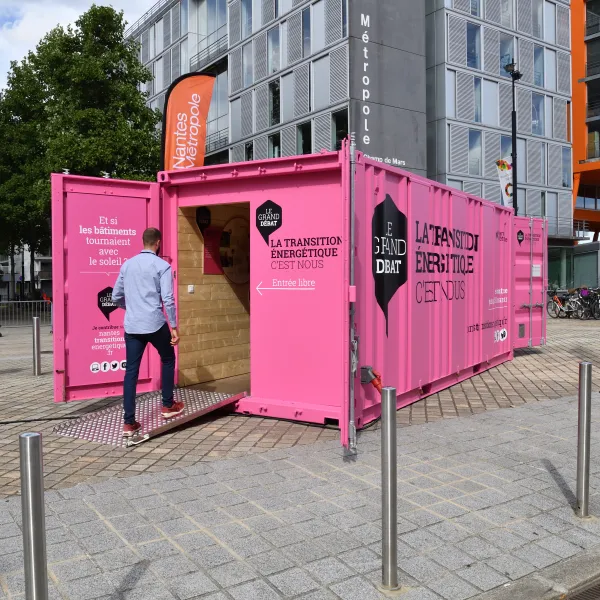
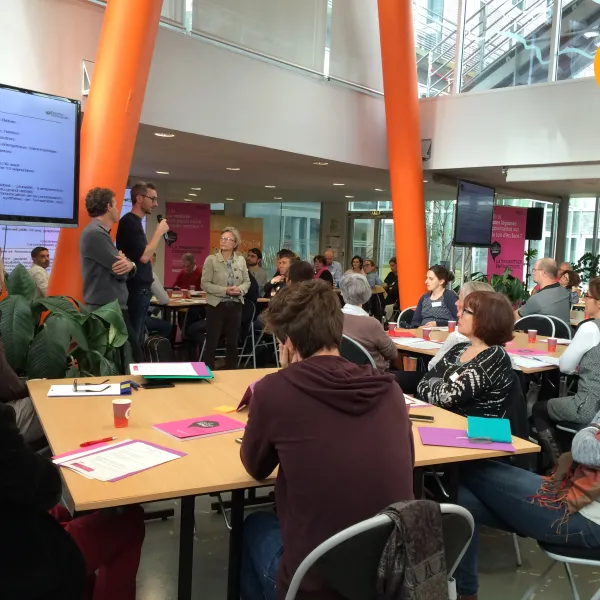
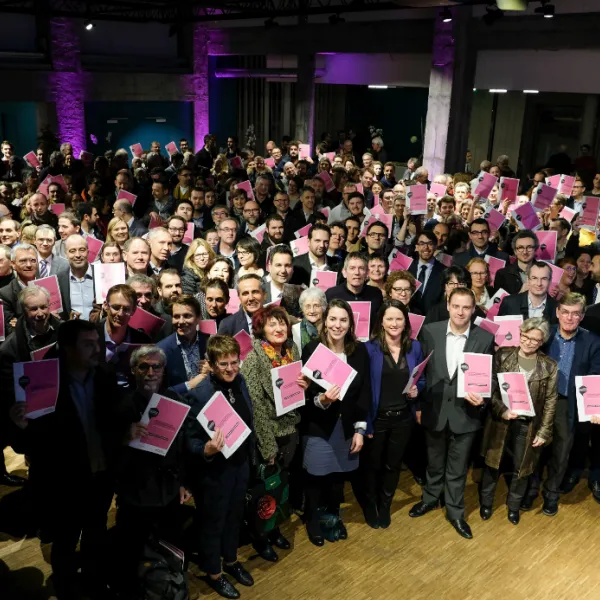
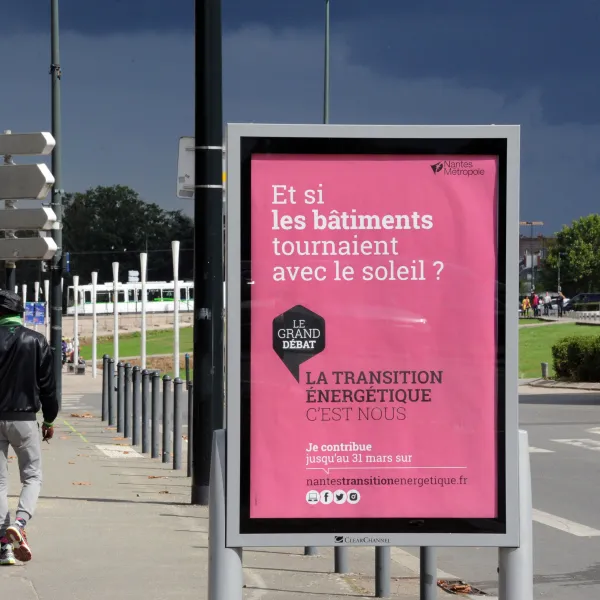
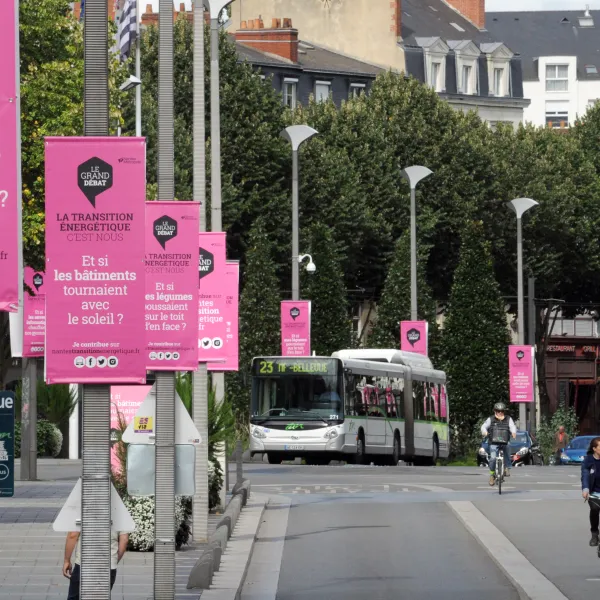
The final report of the Great Debate on the energy transition was published in September 2017. The report led to the citizen-only commission calling on the Metropolitan Council and local stakeholders to produce a shared roadmap, which was later adopted unanimously on February 16, 2018. The roadmap includes an energy transition that:
- Provides benefits to all residents, specifically focusing on transportation and housing
- Utilizes 100 percent local renewable resources
- Increases inhabitants’ ability to act
How’s It Going?
As a result of Nantes’ Great Debate, 500 citizens directly experimented with innovative new ways of implementing the energy transition on Nantes’ territory. Their impressive work resulted in the creation of ten crowdfunding campaigns, the evaluation of 12 projects led by the Nantes Metropolis, the production of an “energy conservation” guide, and the development of five new projects that work on agriculture, aquaponics, and solar energy, among other initiatives.
Nantes’ Climate Action Plan was upgraded in 2018 to reflect the resident-informed commitments issued in the roadmap. One of those commitments led to the creation of an Open Energy Transition Conference, composed of universities, public institutions, consular chambers, and civil society organizations. The group is charged with regularly assessing and monitoring the implementation of the Climate Action Plan and provides another layer of accountability for local government officials.
Climate change remains a constant threat: last summer was the hottest on record in mainland France. Nantes Metropole is continuing to adopt new commitments and innovations to meet the challenges head-on. Nantes joined an initiative last year to be among the first 100 European cities to achieve carbon neutrality by 2030. To this end, Nantes has issued new measures to preserve drinking water, increase renewable energies, and adapt infrastructure across the metropolis to the increasingly higher temperatures.
Considerations
- Not their first time. The debate on energy transition was the second of its kind, following a similar process that consulted residents on water use. This allowed the metropolis to fine-tune the debate’s methodology, and also to build familiarity with the process among residents.
- Framing the debate. The Great Debate began with a careful diagnostic of the energy transition issue, which led to the four main themes and key questions. This framing set the debate up for success and tapped into residents’ local and specialized knowledge on the issues that matter most.
- Political will. The Great Debate had full political backing from Nantes mayor Johanna Rolland and the entire metropolitan council. This ensured not only the means for implementing a meaningful participation process but also facilitated planning and collaboration.
Point of Contact
Laurent Comeliau
Head of the Climate, Food ,and Citizen Participation Division
[email protected]
Who Else Is Trying This?
- Brighton & Hove, UK: In the autumn of 2020, the city council hosted a Citizens’ Assembly on Climate Change. A representative group of 50 residents, selected by sortition, met for five three-hour sessions over a few months to provide recommendations to formulate policies and projects to support the city’s goal to be climate neutral by 2030.
- Budapest, Hungary: The city of Budapest randomly selected 50 residents to form a “people’s panel assembly on climate change.” The panel met for two weekends in September 2020, alongside a group of experts, and crafted a report of eight policy recommendations for the city council. These include recommendations for what the city’s climate goals should be and the steps to achieve them.